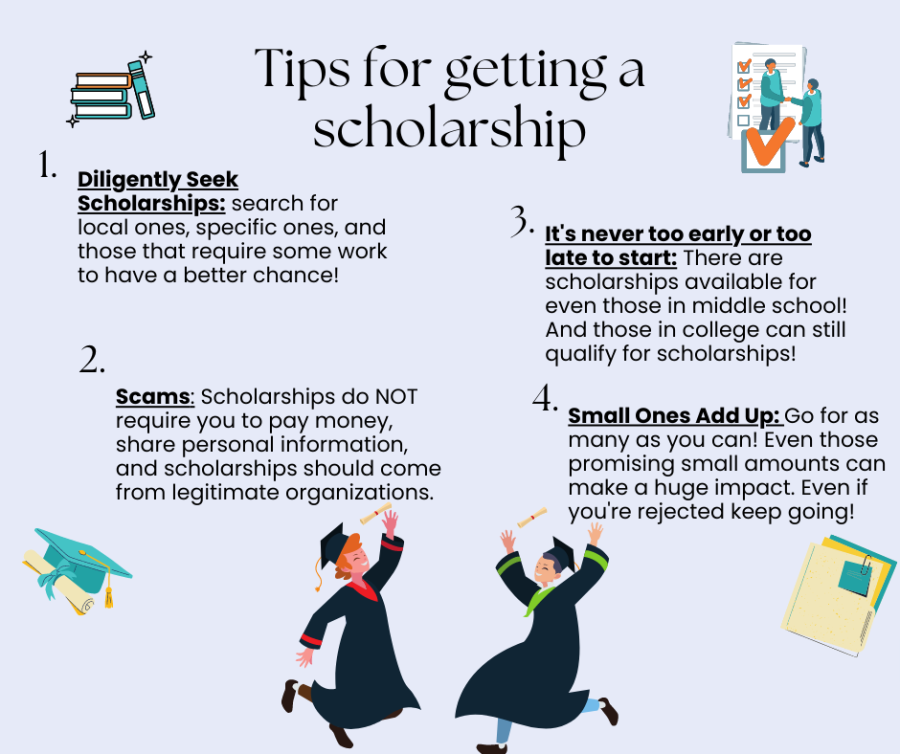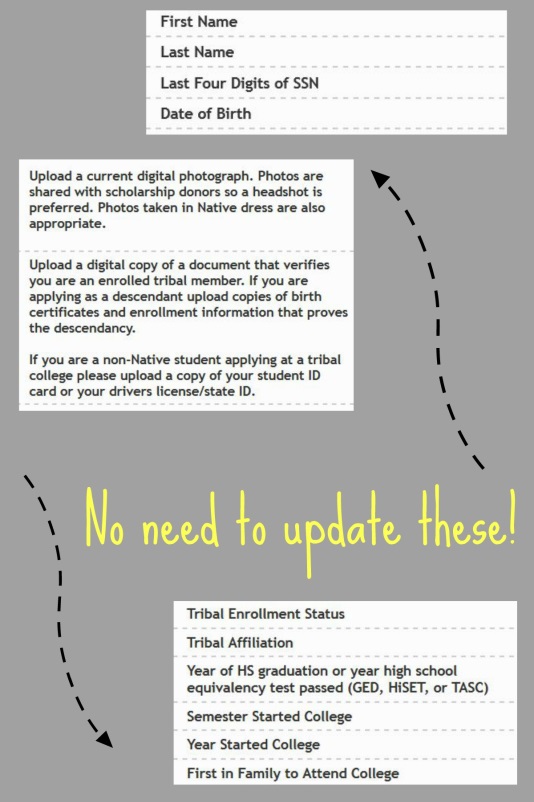Scholarship Tips for Students Who Are Struggling to Qualify

Securing scholarships can feel like a distant dream for students facing academic or financial hardships. Many believe that only top-performing individuals with stellar grades qualify, but that's a misconception. This article debunks common myths surrounding scholarship eligibility and unveils practical strategies tailored for students who are struggling. We’ll explore how to leverage your unique strengths, craft compelling narratives that highlight your potential, and identify lesser-known scholarships with less stringent requirements. By focusing on these actionable tips, even students facing challenges can significantly increase their chances of earning valuable financial aid and achieving their educational goals.
Scholarship Tips for Students Who Are Struggling to Qualify
It's definitely discouraging when you feel like you don't measure up to traditional scholarship criteria. Many scholarships focus on high GPAs, impressive test scores, or exceptional extracurricular achievements. However, there are strategies to increase your chances even if you don't fit that mold. Don't assume that you're automatically disqualified. Instead, focus on highlighting your strengths, researching less competitive scholarships, and presenting your unique story in a compelling way. Understanding the scholarship landscape and tailoring your approach are key to finding opportunities where you can shine. Persistence and a proactive approach are paramount for students who feel they are behind, and they are the real qualifiers.
Focus on Niche Scholarships
Instead of competing for highly sought-after scholarships with thousands of applicants, seek out scholarships specifically designed for students with unique backgrounds, specific fields of study, or particular circumstances. These niche scholarships often have far fewer applicants, increasing your odds of winning. Research scholarships for students from underrepresented groups, those pursuing vocational training, or those facing financial hardships. Also, it's useful to look for scholarships that align with your hobbies or volunteer work. This makes it easier to craft a genuine and compelling application. Make sure to fulfill the specific eligibility criteria and tailor your application directly to that criteria.
Highlight Your Unique Story and Strengths
Scholarship committees are often looking for more than just academic excellence; they want to see who you are as a person. Even if your GPA isn't perfect, emphasize other qualities such as resilience, determination, leadership skills, or your commitment to your community. Use your personal essay to share your story and explain any challenges you've overcome. Showcase your unique perspective and demonstrate your passion for your chosen field of study. Instead of dwelling on your weaknesses, focus on your strengths and how you can contribute to your chosen field and society. Don't be afraid to be vulnerable and authentic in your narrative.
Improve Your Application Materials
Strong application materials can make a significant difference. Make sure your personal essay is well-written, engaging, and free of grammatical errors. Ask a trusted teacher, counselor, or writing center for feedback on your essay. Pay close attention to the scholarship requirements and ensure that your application is complete and meets all deadlines. Proofread everything carefully and tailor your essay to each individual scholarship. A generic essay will not stand out. A polished and compelling application can compensate for a less-than-perfect GPA or test score.
Seek Recommendations from People Who Know You Well
Letters of recommendation can significantly impact your chances of winning a scholarship. Choose recommenders who know you well and can speak to your character, work ethic, and potential. Provide your recommenders with a detailed resume, a copy of your transcript, and information about the scholarship. Give them plenty of time to write a thoughtful and personalized letter. A strong letter of recommendation can highlight your strengths and provide valuable insights into your personality and potential. Remind your recommender of the deadline and follow up to ensure they submit the letter on time.
Be Persistent and Don't Give Up
Applying for scholarships can be a time-consuming and sometimes discouraging process, but it's important to be persistent. Don't get discouraged by rejections. Use each application as a learning experience and continue to refine your approach. The more scholarships you apply for, the greater your chances of winning one. Remember that even small scholarships can add up and help reduce your financial burden. Stay organized, set realistic goals, and celebrate your progress along the way. The act of persisting is itself a sign of dedication and can be considered by many scholarship committees.
| Tip | Description | Why it Helps |
|---|---|---|
| Niche Scholarships | Focus on scholarships with specific requirements. | Reduces competition and aligns with your unique attributes. |
| Highlight Strengths | Emphasize resilience, leadership, and community involvement. | Shows well-roundedness and potential beyond academics. |
| Application Quality | Polish essays and meet deadlines. | Creates a strong impression and demonstrates commitment. |
| Strong Recommendations | Seek letters from people who know you well. | Provides valuable insights into your character and potential. |
| Persistence | Keep applying and learning from rejections. | Increases your chances of winning over time. |
How do you get a scholarship if you don't have good grades?

Focus on Scholarships That Value More Than Grades
- Research niche scholarships. Look beyond the large, general scholarships and focus on those that target specific demographics, interests, or career paths. These often have less stringent GPA requirements.
- Explore scholarships based on extracurricular activities. Many organizations offer scholarships to students actively involved in sports, arts, music, or community service.
- Consider scholarships for students with specific challenges or backgrounds. Some scholarships are designed to support students from underrepresented groups or those who have overcome adversity.
Highlight Your Strengths and Skills
- Showcase your leadership abilities. Detail any leadership roles you've held in clubs, organizations, or sports teams. Quantify your impact whenever possible (e.g., "Increased club membership by 20%").
- Emphasize your talents and skills. Whether you're a skilled writer, artist, musician, or coder, highlight your abilities and provide examples of your work.
- Focus on your work ethic and determination. Even if your grades aren't high, demonstrating a strong work ethic and commitment to improvement can be very persuasive.
Craft a Compelling Personal Essay
- Tell your story honestly and authentically. Explain any circumstances that may have impacted your grades without making excuses. Focus on what you've learned and how you've grown.
- Highlight your goals and aspirations. Show the scholarship committee that you have a clear vision for your future and are committed to achieving your goals.
- Connect your experiences to the scholarship's mission. Demonstrate how your values and experiences align with the scholarship's purpose and how you would contribute to their community.
Seek Strong Letters of Recommendation
- Choose recommenders who know you well and can speak to your character and potential. Ask teachers, mentors, coaches, or employers who have witnessed your strengths firsthand.
- Provide your recommenders with a detailed resume and personal statement. This will help them write a compelling letter that highlights your achievements and potential.
- Give your recommenders plenty of time to write their letters. Don't wait until the last minute to ask for a recommendation.
Don't Give Up and Explore All Options
- Apply to as many scholarships as possible. The more applications you submit, the higher your chances of winning.
- Explore local scholarships. Community organizations and businesses often offer scholarships to local students. These scholarships often have less competition.
- Consider other forms of financial aid. Explore grants, loans, and work-study programs to help cover the cost of your education.
What is the #1 way to increase your chances for a scholarship?

Maintain a Stellar Academic Record
A strong academic record is the most fundamental aspect of a successful scholarship application. Scholarship committees often use GPA and test scores as initial screening criteria. A high GPA demonstrates dedication, discipline, and the ability to master challenging material.
- Focus on achieving high grades in all your courses. Consistently performing well academically shows dedication and competence.
- Take challenging courses that are relevant to your field of study. Demonstrate your willingness to push yourself and explore advanced topics.
- If required, prepare thoroughly for standardized tests (SAT/ACT). Aim for scores that place you in the top percentile of test-takers.
Showcase Exceptional Extracurricular Involvement and Leadership
Scholarship committees are looking for well-rounded individuals who contribute to their communities and demonstrate leadership potential. Actively participating in extracurricular activities and taking on leadership roles shows initiative, commitment, and the ability to work effectively with others.
- Participate in extracurricular activities that align with your interests and passions. Choose activities you genuinely enjoy, as your enthusiasm will be evident.
- Seek out leadership roles in your chosen activities. Leadership experience demonstrates responsibility, initiative, and the ability to inspire others.
- Quantify your achievements in your activities. Use numbers and specific examples to illustrate your impact and accomplishments.
Craft Compelling and Personalized Essays
Scholarship essays are your opportunity to tell your story, showcase your personality, and explain why you deserve the scholarship. A well-written and personalized essay can make a significant difference in your application.
- Brainstorm and choose a topic that allows you to showcase your unique qualities and experiences. Select a topic that you are passionate about and that reflects your personality.
- Write a clear, concise, and engaging essay that addresses the prompt effectively. Use strong verbs, vivid language, and specific examples to illustrate your points.
- Proofread your essay carefully for grammar, spelling, and punctuation errors. A polished and error-free essay demonstrates attention to detail and professionalism.
Secure Strong Letters of Recommendation
Letters of recommendation provide valuable insights into your character, abilities, and potential from individuals who know you well. Choose recommenders who can speak specifically about your strengths and accomplishments.
- Request letters of recommendation from teachers, mentors, or supervisors who know you well and can speak to your abilities. Choose recommenders who have worked with you closely and can provide specific examples of your strengths.
- Provide your recommenders with ample time to write their letters. Give them at least a month's notice and provide them with all the necessary information.
- Waive your right to see the letters of recommendation. This assures the scholarship committee that the letters are honest and unbiased.
Tailor Each Application to the Specific Scholarship Criteria
Avoid submitting generic applications. Research each scholarship thoroughly and tailor your application to meet the specific criteria and priorities of the awarding organization.
- Carefully review the scholarship requirements and eligibility criteria. Ensure that you meet all the requirements before applying.
- Highlight your skills and experiences that align with the scholarship's mission and goals. Emphasize the aspects of your profile that are most relevant to the scholarship.
- Demonstrate your understanding of the awarding organization and its values. Show that you have taken the time to research the organization and its mission.
What not to say in a scholarship application?

Lack of Specifics or Vague Generalities
Avoid making broad statements without providing concrete examples. Saying you "work hard" or are "passionate about learning" is insufficient. Instead, demonstrate your hard work by detailing specific projects, challenges you overcame, and the results you achieved. Back up your claims with evidence to make your application compelling and believable.
- Don't just say you're a "good leader"; describe a specific situation where you demonstrated leadership skills.
- Don't say you "love helping others"; detail a volunteer experience and the impact you made.
- Avoid using filler words or phrases that don't add value to your application.
Excessive Focus on Financial Need Without Merit
While it's acceptable to mention financial hardship briefly, the application should not solely focus on your financial situation. The scholarship committee is primarily interested in your achievements, potential, and how you align with the scholarship's mission. Emphasize your strengths and how the scholarship will enable you to further your goals rather than dwelling on financial need.
- Don't make your entire essay about your poverty; balance it with your accomplishments.
- Don't imply you deserve the scholarship solely because of your financial situation.
- Show how the scholarship will help you achieve your academic or professional goals.
Negative or Complaining Tone
Avoid expressing negativity, complaining about past experiences, or blaming others for your circumstances. Maintain a positive and optimistic tone throughout your application. Even if you've faced challenges, frame them as opportunities for growth and learning. Focus on what you've learned and how you've overcome obstacles, rather than dwelling on negativity.
- Don't complain about your teachers, school, or family.
- Avoid using a sarcastic or cynical tone.
- Focus on your resilience and how you've learned from difficult experiences.
Dishonesty or Exaggeration
Honesty is crucial. Never lie or exaggerate your achievements, grades, or experiences. Scholarship committees often verify information, and dishonesty can lead to immediate disqualification. Be truthful and present your accomplishments accurately. It's better to be honest about your weaknesses and explain how you're working to improve than to fabricate successes. Integrity is paramount.
- Don't inflate your GPA or test scores.
- Don't claim achievements that you didn't actually accomplish.
- Be truthful about your volunteer experiences and extracurricular activities.
Inappropriate Language or Tone
Maintain a formal and professional tone throughout your application. Avoid using slang, colloquialisms, or overly casual language. Remember that the scholarship committee is evaluating your maturity and professionalism. Proofread carefully for grammatical errors and typos, as these can detract from the overall impression of your application. Use proper grammar and spelling and always use the correct formatting.
- Don't use slang or informal language.
- Avoid making jokes or being overly humorous.
- Proofread your application carefully for errors.
What is a hardship scholarship?
A hardship scholarship is a form of financial aid awarded to students who are experiencing unforeseen and significant financial difficulties that threaten their ability to continue their education. These scholarships are designed to provide immediate support to students facing unexpected crises or emergencies. The specific eligibility criteria and the amount of assistance offered vary depending on the institution or organization providing the scholarship. The goal is to help students overcome temporary setbacks and remain enrolled in their academic programs.
Eligibility Criteria for Hardship Scholarships
Eligibility for a hardship scholarship is typically based on demonstrating financial need and experiencing an unforeseen hardship.
- Documentation of the Hardship: Students must provide documentation to verify the hardship, such as medical bills, eviction notices, job loss verification, or death certificates. This paperwork helps the scholarship provider understand the severity and nature of the situation.
- Financial Need Assessment: The student's current financial situation is assessed, often through income statements, bank records, and other relevant financial documents. The assessment helps determine the extent of the financial need and how much assistance is required.
- Academic Standing: In most cases, students must be in good academic standing to be eligible. This ensures that the scholarship is supporting students who are committed to completing their education.
Common Examples of Hardship Situations
A wide range of events can qualify as hardships. These events are typically unexpected and financially devastating to the student or their family.
- Medical Emergencies: Unexpected medical bills, hospitalizations, or the need for ongoing medical treatment can create a significant financial strain. This often includes situations where the student or a close family member requires extensive medical care.
- Loss of Employment: The loss of a job, either by the student or a primary family provider, can disrupt the student's ability to pay for tuition, housing, and other essential expenses. This is especially critical for students who rely on their income to fund their education.
- Natural Disasters: Events such as floods, fires, earthquakes, or other natural disasters can cause significant property damage and financial loss. These events can make it nearly impossible for students to continue their education without assistance.
How to Apply for a Hardship Scholarship
The application process for a hardship scholarship usually involves submitting a detailed application, providing documentation of the hardship, and possibly participating in an interview.
- Contact the Financial Aid Office: The first step is to contact the financial aid office at the student's institution. They can provide information about available hardship scholarships and the specific application requirements.
- Gather Documentation: Collect all necessary documents, such as medical bills, employment termination notices, and financial statements. The more thorough the documentation, the stronger the application will be.
- Submit a Detailed Application: Fill out the application form completely and accurately. Be sure to explain the hardship in detail and how it is affecting the student's ability to continue their education.
Impact of Hardship Scholarships
Hardship scholarships can have a profound impact on students facing financial difficulties, helping them stay in school and achieve their academic goals.
- Reduced Stress and Anxiety: By alleviating financial pressure, these scholarships can reduce stress and anxiety, allowing students to focus on their studies. The mental and emotional relief can significantly improve academic performance.
- Improved Academic Performance: With financial worries eased, students can dedicate more time and energy to their studies, leading to improved grades and academic outcomes. This creates a positive cycle of success and motivation.
- Increased Retention Rates: Hardship scholarships help students stay enrolled in their programs, increasing retention rates and the likelihood of graduation. This contributes to the overall success of the institution and the student's future career prospects.
Where to Find Hardship Scholarships
Hardship scholarships are often offered by educational institutions, private organizations, and community foundations.
- College and University Financial Aid Offices: These offices are the primary resource for information on institutional hardship funds and scholarships. They can provide guidance on eligibility requirements and application procedures.
- Private Foundations and Nonprofits: Many private foundations and nonprofit organizations offer scholarships specifically for students facing financial hardships. Researching these organizations can uncover additional opportunities.
- Online Scholarship Databases: Websites like Sallie Mae, Scholarships.com, and Fastweb offer extensive databases of scholarships, including those for hardship situations. These platforms can help students identify potential funding sources.
Frequently asked questions
What if my grades aren't high enough to qualify for most scholarships?
Focus on scholarships that value extracurricular activities, community involvement, or specific skill sets; alternatively, explore scholarships with lower GPA requirements or those geared toward students from specific backgrounds or fields of study, and always highlight your strengths and potential in your application essay.
How can I make my scholarship application stand out if I don't have a lot of achievements?
Craft a compelling personal essay that showcases your passion, determination, and unique story, even if your achievements are limited; emphasize your growth, lessons learned from challenges, and your future goals, demonstrating your potential to succeed with the scholarship's support.
Are there any scholarships specifically for students who have overcome challenges?
Yes, many scholarships are designed for students who have faced adversity, such as financial hardship, disabilities, or personal struggles; these scholarships often prioritize resilience and determination, so be sure to research and apply for those that align with your personal experiences, highlighting how you've overcome obstacles.
What resources can help me find scholarships that I might qualify for?
Utilize online scholarship search engines and databases, such as Fastweb, Scholarships.com, and Peterson's, filtering by eligibility criteria like GPA, major, and background; also, contact your school's guidance counselor or financial aid office for information about local and institutional scholarships, and explore scholarships offered by professional organizations in your field of interest.
